When it comes to selling online, choosing the right eCommerce platform can make or break your success. Shopify and eBay are two of the most popular options, but they serve different types of sellers.
- Shopify is a fully customizable online store builder, perfect for brands that want full control over their website, branding, and marketing.
- eBay is a global online marketplace where sellers can list products quickly and benefit from an existing audience of millions of buyers.
So, which one is better for you? That depends on your business model, budget, and long-term goals.
In this article, we’ll compare Shopify vs eBay across 9 critical factors to help you make the best decision:
- #1. Pricing and selling fees
- #2. Ease of use
- #3. Design and customization
- #4. eCommerce features
- #5. Scalability and growth potential
- #6. Payment options
- #7. Marketing and SEO features
- #8. Security
- #9. Customer support system
Let’s dive right in!
Shopify vs eBay – An Overview
Shopify pros and cons
Shopify is a leading eCommerce platform designed to help businesses build and run their online stores with ease. Known for its flexibility and scalability, Shopify caters to businesses of all sizes, from small startups to large enterprises. It provides tools for setting up an online store, managing products, processing payments, and customizing the design to reflect your brand.

One of Shopify’s biggest strengths is its ecosystem of apps and themes, allowing users to expand their store’s functionality without the need for extensive technical knowledge. Whether you're selling physical products, digital goods, or services, Shopify equips you with the tools needed to grow your business online.
Below is a Shopify pros and cons table for your reference.
Pros | Cons |
- Full control over branding and customization: Shopify allows users to create a unique, branded store using free and paid themes, as well as advanced customization options with HTML and CSS. | - No free plan: Shopify runs on a subscription-based pricing model, which can be costly for businesses that are on the tight budget. |
- Scalable for growth: Shopify supports businesses as they grow, with tools for multi-channel selling, integrations, and apps that can handle large inventories. | - Transaction fees: Unless you use Shopify Payments, transaction fees are applied for every sale, increasing operational costs. |
- Beginner-friendly interface: Shopify’s dashboard is intuitive, making it easy for new users to set up and manage their stores. | - Learning curve for advanced features: Customizing themes or using advanced apps may require technical expertise or hiring a developer. |
- Extensive app store: With thousands of apps, Shopify lets you add functionality such as marketing tools, inventory management, and customer support features. | - Limited control over backend hosting: While Shopify handles hosting and security, users have less control over technical aspects compared to self-hosted platforms. |
- Built-in SEO features: Shopify provides tools like customizable URLs, metadata editing, and sitemaps, helping you optimize your store for search engines. | - Limited advanced analytics: Advanced reporting and analytics features are only available on higher-tier plans. |
- Shopify Payments integration: A native payment gateway with no additional transaction fees (on eligible plans) simplifies payment processing. | |
- Free SSL certificate: Shopify includes SSL certificates for secure transactions, enhancing customer trust. |
eBay pros and cons
eBay is one of the largest online marketplaces, connecting millions of buyers and sellers worldwide. Unlike Shopify, which requires building a standalone store, eBay allows businesses to list products directly on its platform, benefiting from its existing traffic and broad audience base. Sellers can quickly reach potential customers without investing time and resources in developing their own websites.
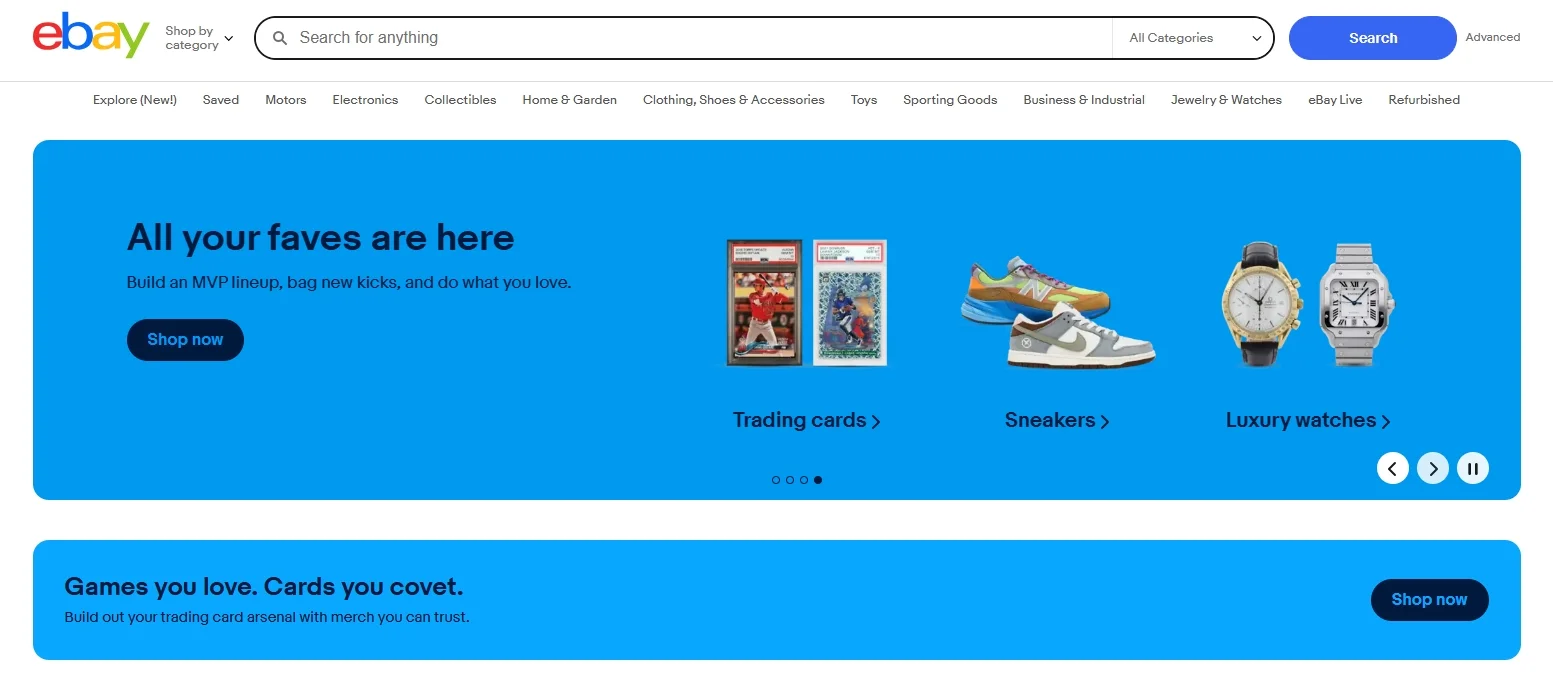
eBay’s unique features, such as auction-style listings and a built-in buyer community, make it an attractive choice for sellers looking to test products, sell collectibles, or cater to niche markets. However, the platform’s competitive nature and fee structure comes with its own set of challenges.
Here's a breakdown of all eBay pros and cons:
Pros | Cons |
- Access to a large audience: eBay boasts millions of active buyers globally, providing instant exposure to your products. | - High seller fees: eBay charges various fees, including listing fees and final value fees, which can add up quickly, especially for high-volume sellers. |
- Quick setup: Listing products on eBay is simple and fast, with pre-set templates and minimal technical expertise required. | - Competitive marketplace: The large number of sellers on eBay creates intense competition, often leading to price wars. |
- Auction-style listings: eBay’s auction feature enables sellers to attract buyers interested in bidding, which can drive up the price of rare or in-demand items. | - Limited branding opportunities: eBay’s standardized listing format offers minimal scope for customization or building a unique brand identity. |
- Global reach: eBay facilitates international sales, helping sellers reach buyers across borders with built-in tools for shipping and currency conversion. | - Strict policies for sellers: eBay’s stringent policies and performance standards can lead to account suspension for minor infractions. |
- Payment protection: eBay’s managed payments system ensures secure transactions for both buyers and sellers. | - Limited scalability: As businesses grow, eBay’s marketplace structure may become restrictive, especially for sellers looking to create a strong brand presence. |
- Flexible selling options: Sellers can choose from fixed-price listings or auctions, catering to different types of products and strategies. | - Less control over the sales process: Sellers must adhere to eBay’s rules, limiting their autonomy compared to independent platforms like Shopify. |
Shopify vs eBay: What Are The Differences?
The biggest difference between Shopify vs eBay lies in their business models. Shopify is a platform for building and managing a standalone online store, while eBay is an established marketplace where sellers list their products alongside others. These fundamental differences shape how each platform operates and what they offer to businesses.
➤ The verdict: Shopify is ideal if you want full control over your store and long-term brand growth. eBay is better if you prefer quick setup and access to an existing buyer base. But let’s dive deeper into the details!
Below, we break down the key differences between Shopify vs eBay.
Shopify | eBay | The Winner | |
Pricing and selling fees | $39 - $399/month with unlimited listings | $7.95 - $349.95/month with limited listings depending on each plan | Shopify wins |
Ease of use | Shopify is intuitive, but building a whole eCommerce website still takes some time. | eBay’s generally easier and faster to list your products, set up your store and get started. | eBay wins |
Design and customization | Shopify allows you to fully customize your store. | With eBay, you have to use the same template with many other stores on the marketplace. | Shopify wins |
eCommerce features | You have a strong suite of eCommerce functionalities with Shopify like inventory management, shipping and tax calculators, etc. | eBay focuses more on helping sellers connect with buyers. The marketplace is also famous for its auction-style selling support. | Shopify wins |
Scalability and growth potential | Shopify has fantastic scalability and growth potential with its App Store, Shopify POS integration, and omnichannel capabilities. | eBay is great with its existing global audience | Shopify wins |
Payment options | Shopify supports over 100 third-party payment gateways. | eBay’s payment options can be restricted. | Shopify wins |
Marketing and SEO features | The platform gives you various SEO and marketing features. | The marketplace focuses more on SEO features to get your products seen. | Shopify wins |
Security | Shopify is highly secure | eBay is also very secure. but it doesn't give sellers as many methods to secure their shops. | It's a tie |
Customer support system | Shopify offers 24/7 customer support via phone, email, and live chat. | eBay offers customer support through a ticketing system and a community forum | It's a tie |
#1. Pricing and Selling Fees (Shopify Wins)
➤ The verdict: Shopify is more affordable than eBay.
When it comes to Shopify vs eBay in pricing and selling fees, Shopify offers better value for money because the price you pay comes with a more comprehensive set of eCommerce features. While Shopify’s subscription plans may appear costlier upfront compared to eBay’s fee-per-sale structure, the benefits you receive far outweigh the investment.
Shopify is subscription-based, which means the platform charges merchants a monthly fee to use. With pricing ranging from $39 to $399 per month, depending on the level of features and support needed, Shopify provides businesses of all sizes with a suitable plan.
Here are the most common pricing plans for Shopify:
- Basic Shopify: $39 per month, offers you a standalone website with an eCommerce store and a blog.
- Shopify: $105 per month, allows you to create a more powerful store with robust selling functions.
- Advanced Shopify: $399 per month, suitable for midsize to large businesses.
It’s also noteworthy that all Shopify plans let you add unlimited products to your store without any cap.
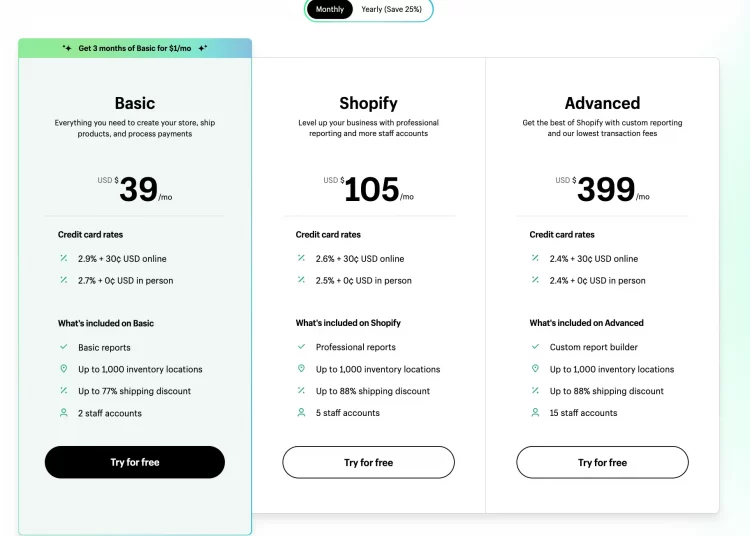
Shopify now offers a 3-day free trial and then you get to use any plan we mentioned at $1 for the first 30 days. This is a great advantage new sellers can take to figure out if this platform is suitable or not.
In addition to the subscription fee, businesses using Shopify will also need to pay payment processing fees, as well as the extra cost for any paid themes or third-party apps that they use on their store.
Similar to Shopify, to open an eBay store, you’ll also have to pay the platform a monthly subscription fee and other fees required by the platform as follow:
Starter Store | Basic Store | Premium Store | Anchor Store | |
Monthly price | $7.95/month; $4.95/month if billed annually | $27.95/month; $21.95/month if billed annually | $74.95/month; $59.95/month if billed annually | $349.95/month; $299.95/month if billed annually |
Number of free listings per month | 250 | 250 auction style 1,000 fixed price | 500 auction style 10,000 fixed price | 1,000 auction style 25,000 fixed price |
Exceeding listing fees (per listing) | 30¢ | 25¢ | 15¢ auction style 10 ¢ fixed price | 10¢ auction style 5¢ fixed price |
Final value fees* | 0.5% to 15% of total amount, plus 30¢ | 0.5% - 14.95% of total amount plus 30¢ | 0.5% to 14.95% of total amount plus 30¢ | 0.5% to 14.95% of total amount plus 30¢ |
*This fee depends on the category of your products and sale prices on eBay. Normally, it would be in the range of 2.35% to 12.35%.
Additionally, eBay offers a range of paid features and services – such as promoted listings and advanced listing upgrades – that can add additional fees to the selling process.
With all the fees combined, if you have a large product catalog or process high volume sales, eBay is definitely more pricey than Shopify.
#2. Ease of Use (eBay Wins)
➤ The verdict:
In terms of ease of use between Shopify vs eBay, eBay takes the win for its simplicity and accessibility. eBay’s straightforward setup process and predefined templates allow sellers to start listing products quickly, making it an excellent choice for beginners or casual sellers.
Shopify is designed to help users of all experience levels set up and manage an online store with minimal hassle. Its intuitive dashboard guides users through every step, from adding products to customizing the store’s design. The drag-and-drop functionality for themes makes it easy for non-technical users to create a professional-looking store without coding.

Shopify also provides comprehensive support resources, including setup wizards, tutorials, and a robust knowledge base. However, for more advanced customizations, users may need to hire a developer or learn basic coding, which can pose a challenge for complete beginners.
On the other hand, eBay is one of the simplest platforms to start selling on. Its step-by-step listing process requires minimal setup and allows sellers to quickly upload products with predefined templates. This makes it particularly attractive for casual sellers or those looking to test the waters without committing to a full-fledged online store.
While eBay’s simplicity is a strength, it can become limiting for businesses with larger inventories or more complex needs. Managing bulk listings and optimizing product visibility can be time-consuming, especially as sellers scale their operations. Additionally, sellers have less control over the overall buyer experience due to the standardized marketplace format.
#3. Design and Customization (Shopify Wins)
➤ The verdict:
Shopify is the clear winner when it comes to design and customization between Shopify vs eBay. Its vast library of themes, drag-and-drop editor, and advanced coding options allow businesses to create a unique and professional online store tailored to their brand.
Shopify excels in design and customization, giving users full control over the look and feel of their online store. With a wide range of professionally designed themes – both free and paid – Shopify caters to various industries and styles. Its intuitive drag-and-drop editor allows users to easily customize layouts, colors, fonts, and images without needing technical expertise.
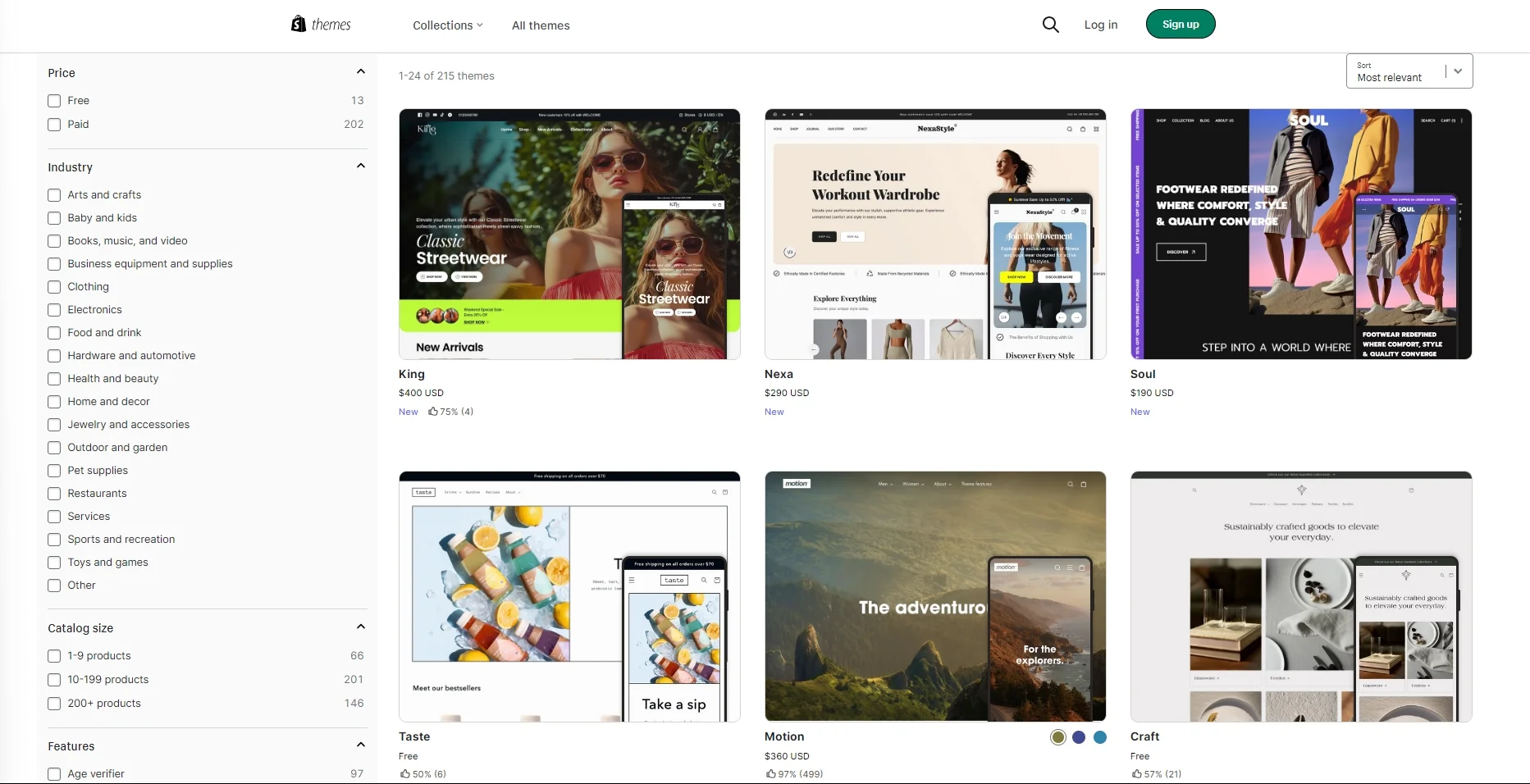
For advanced users, Shopify also offers access to the theme’s code, enabling deeper customization through HTML, CSS, and Liquid (Shopify’s template language). This flexibility ensures businesses can create a truly unique storefront that aligns with their brand.
Now, let's talk about eBay. eBay is a marketplace, so its design capabilities are naturally more limited compared to Shopify. Sellers create listings within eBay’s standardized template structure, which provides consistency across the platform but offers little room for creativity or branding. You can add product photos, descriptions, and a store logo, but these customizations are restricted to individual listings rather than creating a cohesive storefront.
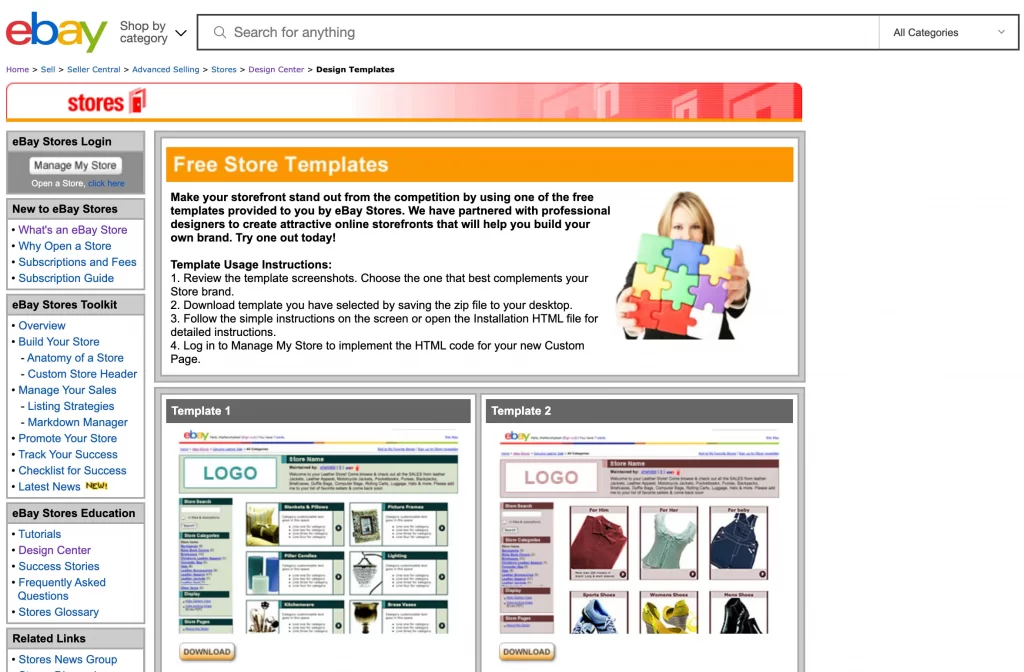
While eBay allows sellers to create a “Storefront” page with some branding elements, the overall design is still controlled by eBay’s platform, limiting the ability to create a unique shopping experience. This can be a drawback for businesses looking to establish a strong brand presence.
#4. eCommerce Features (Shopify Wins)
➤ The verdict:
When it comes to eCommerce features between Shopify vs eBay, Shopify is the clear winner. Its robust set of tools for inventory management, multi-channel selling, and checkout customization provides everything businesses need to grow and succeed.
Shopify provides a full suite of eCommerce features designed to help businesses manage their stores effectively and scale as they grow. Key features include:
- Inventory management: Shopify allows you to manage large product catalogs effortlessly, track inventory levels, and receive notifications when stock is running low.
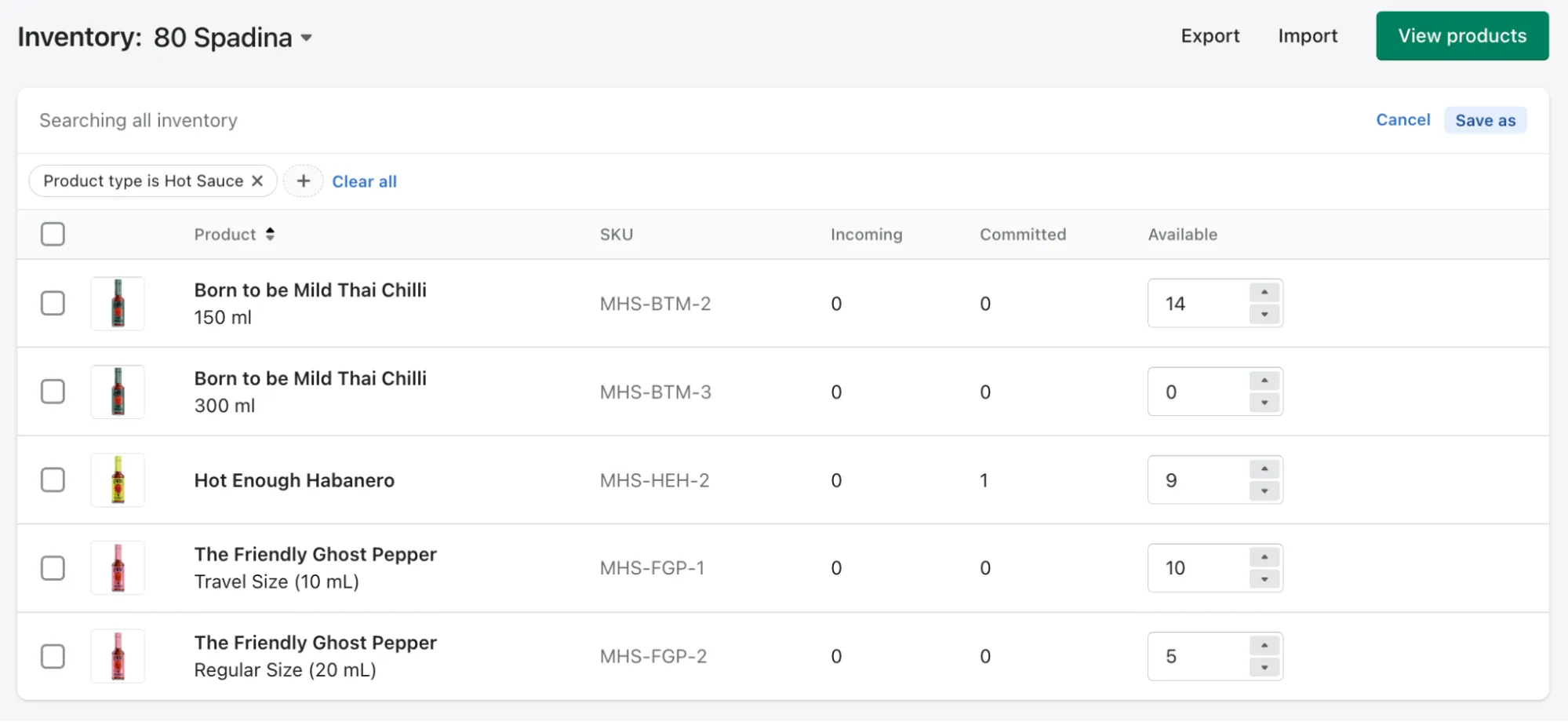
- Multi-channel selling: Seamlessly integrates with platforms like Facebook, Instagram, TikTok, and Amazon to sell across multiple channels from a single dashboard.
- Abandoned cart recovery: Automatically send reminders to customers who left items in their cart, helping you recover lost sales.
- Third-party Integrations: Shopify’s extensive app store offers thousands of integrations to expand functionality, from marketing tools to advanced analytics and fulfillment solutions.
- Customizable checkout process: Shopify provides flexibility in tailoring the checkout experience, including options for upselling, discounts, and customized payment methods.
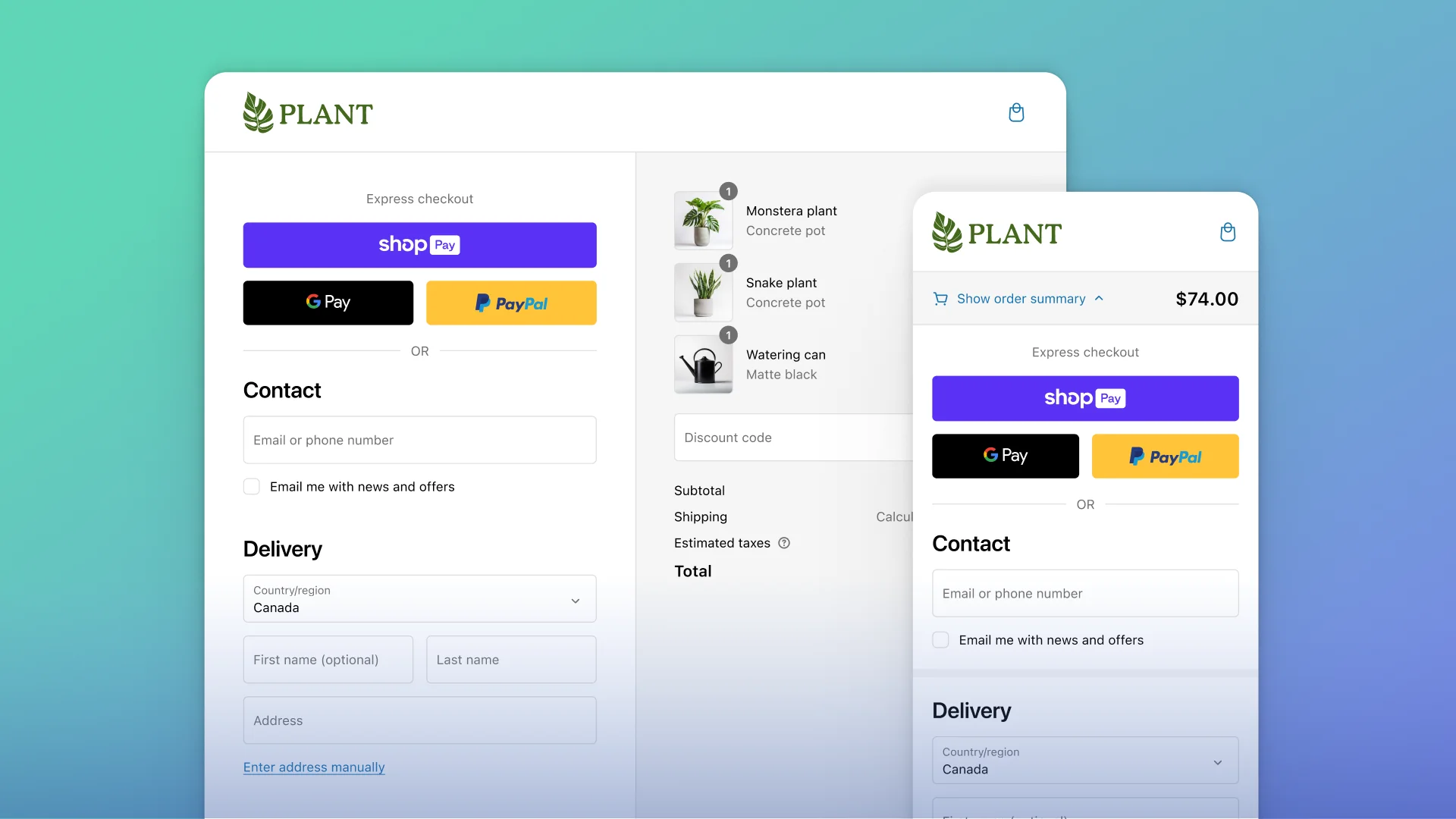
These features ensure that Shopify is not only ideal for small businesses but also scalable for larger operations with complex needs.
As a marketplace, eBay’s eCommerce features are focused on listing and selling products within its ecosystem. Key features include:
- Product listings: eBay’s simple listing process includes pre-set templates for creating product descriptions, uploading photos, and setting prices.
- Auction options: Sellers can choose between fixed-price listings or auction formats, appealing to a wide range of buyers.
- Buyer protection: eBay offers built-in tools to resolve disputes and protect both buyers and sellers during transactions.
- Promoted listings: Sellers can boost the visibility of their products by using paid promotion options within eBay’s search results.
While these features are effective for listing and selling products quickly, they are limited in scope and lack the advanced tools needed for long-term business growth.
#5. Scalability and Growth Potential (Shopify Wins)
➤ The verdict:
Shopify is the clear winner when it comes to scalability and growth potential between Shopify vs eBay. Its powerful tools, flexible infrastructure, and ability to build a unique brand make it an ideal platform for businesses that want to expand and adapt to changing market demands.
Shopify is built to handle growth seamlessly, offering a scalable hosting infrastructure that ensures your online store performs reliably even during peak traffic periods. Whether your business experiences seasonal surges or consistent growth over time, Shopify’s cloud-based hosting adapts to your needs without compromising speed, security, or functionality. This infrastructure is particularly advantageous for businesses with large product catalogs or those running major promotional campaigns, as it eliminates the need to worry about server crashes or downtime.
In addition to its scalable hosting, Shopify boasts a robust app ecosystem that allows businesses to expand their store’s functionality with ease. From inventory management and marketing automation to advanced analytics and customer support tools, the Shopify App Store offers thousands of integrations designed to meet the unique needs of growing businesses. This flexibility enables you to tailor your store to your evolving requirements without the need for significant technical expertise.

In contrast, eBay’s growth potential is limited by its marketplace structure. While eBay provides access to a large, ready-made audience, its scalability is constrained by factors such as competitive pricing, limited branding opportunities, and the inability to build direct customer relationships. Sellers must operate within eBay’s standardized framework, which restricts customization and long-term brand differentiation. Additionally, eBay’s increasing fees can eat into profits as your sales volume grows, making it harder to reinvest in your business.
#6. Payment Options (Shopify Wins)
➤ The verdict:
Overall, Shopify provides sellers with more payment options. It works well with over 100 payment gateways, allowing you to accept payments in any option you can think of. Meanwhile, comparing Shopify vs eBay, eBay might be a little bit limited in terms of payment options.
Shopify has the so-called Shopify Payments, which is Shopify’s payment gateway. If you live in the countries where Shopify Payments is supported, you can enable this gateway and accept major credit cards, accept payments in local currencies, etc.

Besides this powerful in-house payment gateway, Shopify supports seamless integration with 100+ popular payment gateways worldwide. This means your shoppers can check out comfortably in their preferred payment method, including Stripe, PayPal, Square, and even less common methods like cryptocurrencies, Buy now pay later (BNPL), etc.
Comparing Shopify vs eBay in this area, eBay’s payment options can feel restricted as the marketplace only supports payment processing in one of the following methods:
- PayPal
- PayPal Credit
- Credit card or debit card
- Apple Pay
- Google Pay
- Venmo
- Spendable funds
- Payment upon pickup
- Wire transfer facilitated by eBay (select categories only)
- eBay gift card or eBay voucher or eBay Bucks.
#7. Marketing and SEO Features (Shopify Wins)
➤ The verdict:
Shopify has superior marketing and SEO features. If you want full control over how you market your store and reach customers, Shopify is your best bet between Shopify vs eBay.
Shopify packs a punch when it comes to marketing and SEO tools that allow you to promote your store effectively and experiment with multiple marketing channels. Here's what you get:
- SEO features: Shopify provides built-in SEO features that make it easy to optimize your store. You can customize meta titles, descriptions, and URLs for all your products and pages. The platform automatically generates canonical tags, robots.txt files, and sitemaps, saving you time and ensuring search engine compliance.
- Content marketing: With Shopify, you can create a blog directly on your store, allowing you to implement content marketing strategies to improve your SEO and engage customers.
- Email marketing: Shopify offers integrated email marketing features with its in-house app– Shopify Email, enabling you to create targeted campaigns and nurture customer relationships directly from your store's backend.
- Discount codes: If you plan to run flash sale campaigns regularly, you’d be delighted to know that Shopify enables you to create discount codes and apply to your selected products with ease.
- Analytics: Shopify's analytics give you detailed data on traffic sources, conversion rates, customer behavior, and more.
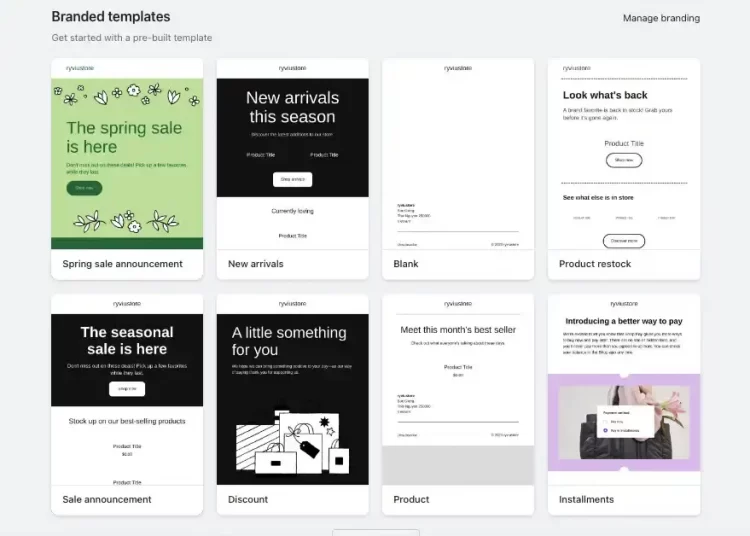
Meanwhile, eBay works differently as it's a big online marketplace rather than a personal store platform. From our experience, eBay's marketing and SEO features are more limited and focused on optimizing within the eBay ecosystem:
- Internal SEO: eBay's SEO is primarily focused on optimizing for their internal search engine, Cassini. You can use relevant keywords in titles and descriptions, but you have less control over crucial SEO elements like URLs or meta descriptions 1.
- Promoted listings: eBay offers a paid promotion feature to boost your listings' visibility within the platform, but this doesn't extend to external search engines.
- Analytics: eBay provides basic analytics on sales performance, listing views, and buyer demographics. However, these insights are less detailed and customizable compared to Shopify's offerings.
#8. Security (Shopify Wins)
➤ The verdict:
Shopify slightly wins. Both Shopify vs eBay care about security, but they do it differently. Shopify seems to offer more protection for individual online stores. eBay's security is good for the entire marketplace, but it doesn't give individual sellers as many options to secure their own shops.
Shopify takes security seriously. They offer many features to keep online stores safe:
- They follow strict payment security rules (PCI DSS Level 1).
- Every store gets a security certificate (SSL) to keep customer data safe.
- Shopify's team is always on the lookout for security risks and updates the system often.
- Store owners can use two-step login (2FA) for extra account protection.
eBay also works hard to keep its users safe:
- They use strong encryption to protect data.
- eBay follows payment security rules too.
- They watch for strange account activity.
- Users can set up two-step login for better account safety.
Clearly, eBay's security is more about protecting the whole marketplace, not just individual stores. They don't offer as many custom security options as Shopify does for each seller.
#9. Customer Support System (Shopify Wins)
➤ The verdict:
Shopify’s support system slightly edges over eBay’s. Both Shopify vs eBay offer good customer service. However, Shopify's round-the-clock availability and responsive support team make it a more appealing option. While eBay's ticket system and community forum can be helpful, the marketplace still comes after its competitor.
Shopify offers 24/7 customer support through various channels, including phone, email, and live chat. They also have an extensive help center with articles and tutorials that can help users troubleshoot issues on their own.
Shopify's customer support team is known for being responsive and knowledgeable, which is essential when running an online store. Users can also get practical advice from the active Shopify community.
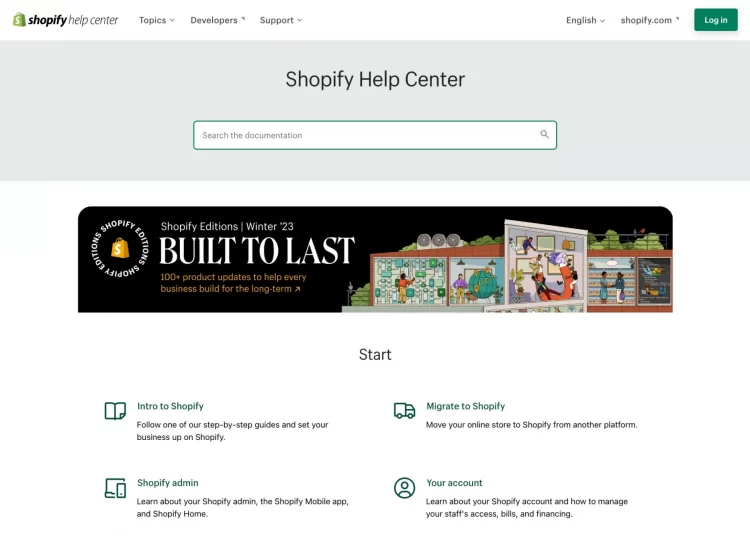
On the other hand, eBay offers customer support through a ticketing system and a community forum where you can ask questions and get answers from other eBay users. While eBay does have a knowledge base with articles and tutorials, it may not be as comprehensive as Shopify's. Its customer support response time may also vary depending on the issue and the volume of support requests.
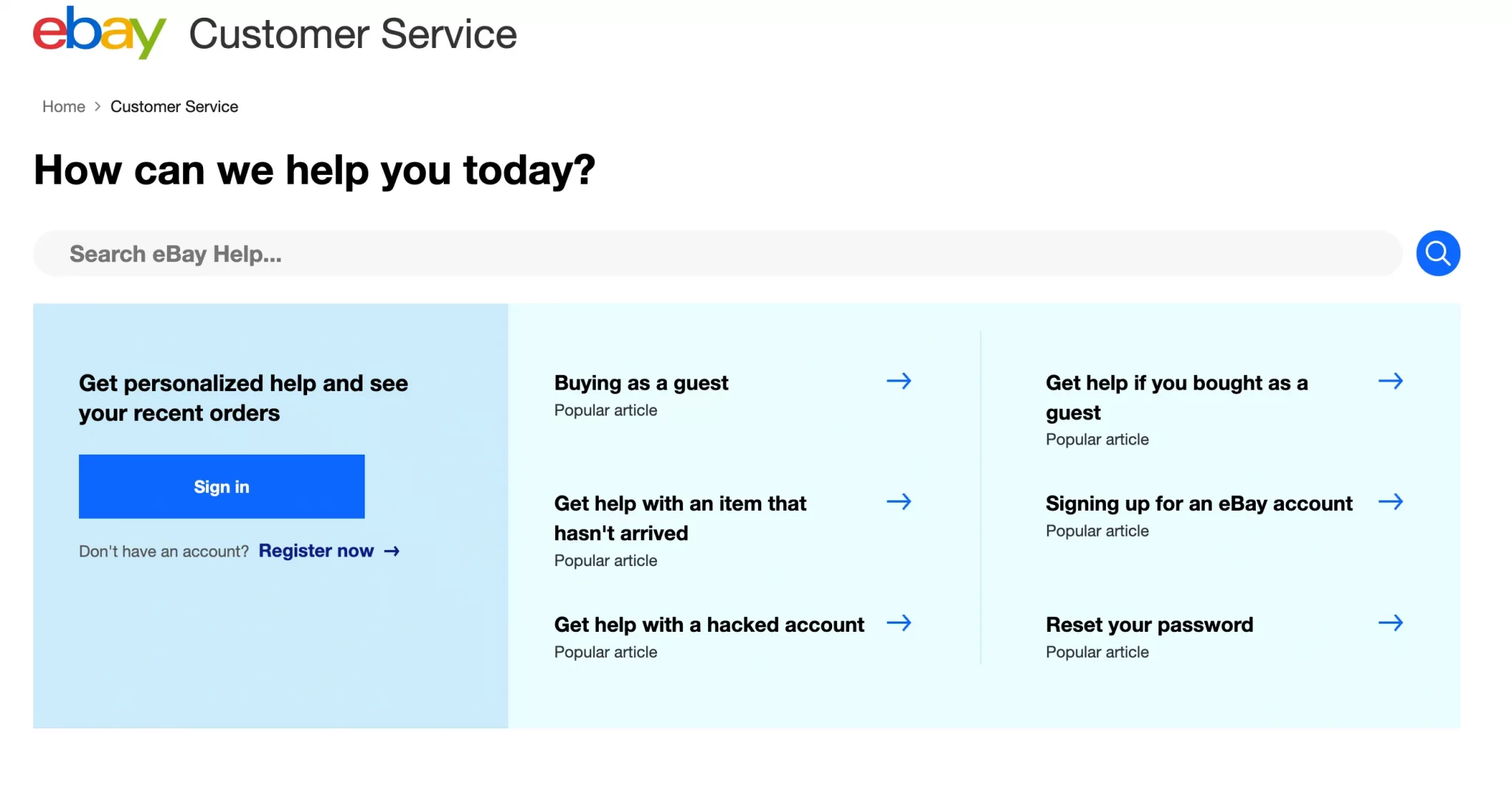
Shopify vs eBay Integration – Is It Possible?
Yes, integrating Shopify with eBay is entirely possible and can be an excellent strategy for businesses looking to combine the strengths of both platforms. By connecting Shopify’s customizable storefront with eBay’s massive audience, you can sell across both channels seamlessly, maximizing your reach and boosting sales.
One of the most effective ways to integrate Shopify with eBay is by using LitCommerce, a trusted multichannel integration tool. LitCommerce simplifies the process of managing your Shopify store and eBay listings by synchronizing data across platforms. This means you can manage your inventory, orders, and pricing from a single dashboard, eliminating the hassle of switching between platforms and reducing the risk of errors.
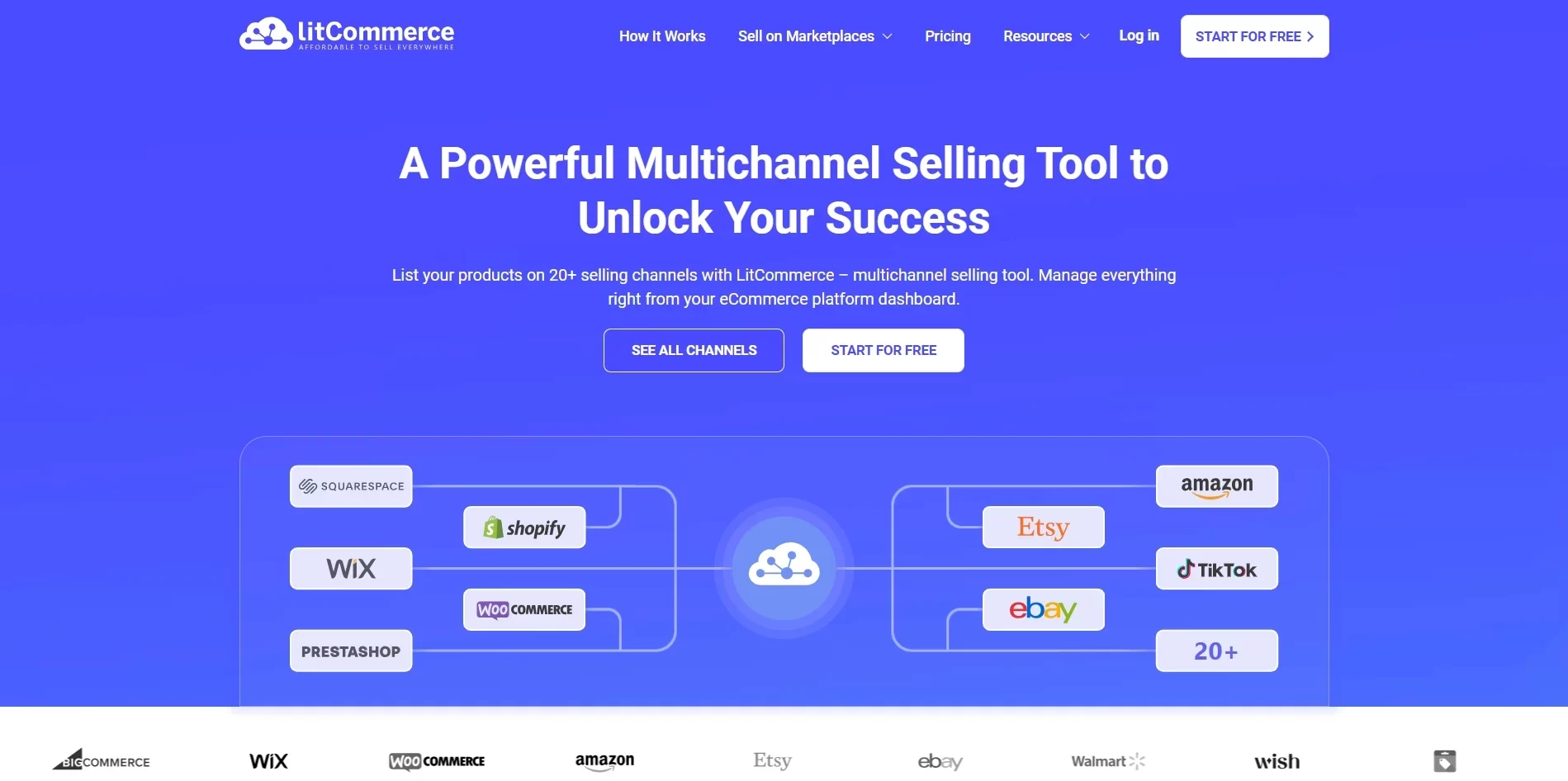
LitCommerce offers several key benefits for Shopify and eBay integration:
- Effortless synchronization: Automatically sync inventory and pricing between Shopify and eBay to ensure consistency across channels.
- Centralized order management: Manage orders from both Shopify and eBay within one platform, streamlining your workflow and saving time.
- Product listing simplification: Create and update eBay listings directly from your Shopify store, reducing duplicate efforts.
- Scalable solution: Whether you’re a small business or a growing enterprise, LitCommerce supports your multichannel strategy with tools that grow alongside your business.
By integrating these platforms with the help of LitCommerce, you can streamline your operations, reduce manual tasks, and focus on scaling your business. For businesses aiming to maximize their online presence and sales potential, Shopify eBay integration is an invaluable tool.
Shopify vs eBay – FAQs
What is best, Shopify or eBay?
The answer depends on your business needs and goals. Shopify is better than eBay if you want to build a fully branded online store with complete control over design, customer experience, and scalability. It’s perfect for businesses that want to establish a long-term eCommerce presence.
On the other hand, eBay is better than Shopify if you want quick access to a large audience without the need to set up and maintain a standalone store. For businesses seeking the best of both worlds, integrating Shopify with eBay is an excellent strategy.
Can I sell on eBay through Shopify?
Yes, you can sell on eBay through Shopify by integrating the two platforms. Tools like LitCommerce make this process seamless by syncing inventory, orders, and pricing between Shopify and eBay. This allows you to manage both channels from a single dashboard, reducing manual work and streamlining operations.
Is Shopify hard to sell on?
No, Shopify is designed to be user-friendly and accessible for sellers of all experience levels. Its intuitive interface, drag-and-drop editor, and extensive resources make setting up and managing a store straightforward. While there may be a learning curve for more advanced features or customizations, Shopify’s 24/7 support and robust app ecosystem make it easy to get the help and tools you need to succeed.
Why do people use Shopify instead of Amazon?
People use Shopify instead of Amazon because Shopify allows them to build their own online store with complete control over branding, design, and customer relationships. Unlike Amazon, where sellers compete within a marketplace and adhere to strict rules, Shopify gives businesses the freedom to create a unique shopping experience tailored to their brand.
Shopify also offers better tools for scaling, multi-channel selling, and integrating with other platforms like eBay, making it a more versatile option for long-term growth.
Final Thoughts
In conclusion, both Shopify vs eBay have their own unique features and advantages for businesses.
- Shopify is a great option for those looking for advanced customization options, robust eCommerce features, and a focus on building a brand.
- On the other hand, eBay can help you leverage its existing marketplace and take advantage of a large customer base.
Regardless of which platform you choose, it's important to remember that success in eCommerce ultimately comes down to the quality of the products, the marketing efforts, and the customer experience. By focusing on these areas, businesses can succeed whether they decide on Shopify or eBay, and ultimately achieve their eCommerce goals.
If you’re interested in articles like this one, we bet you’ll find many other interesting readings at LitExtension’s eCommerce platform blogs. Don’t forget to join our active Facebook community group to expand your network and learn from 18,000+ global entrepreneurs.
See more: Shopify Competitors: Comparing Top Alternatives for Ecommerce

